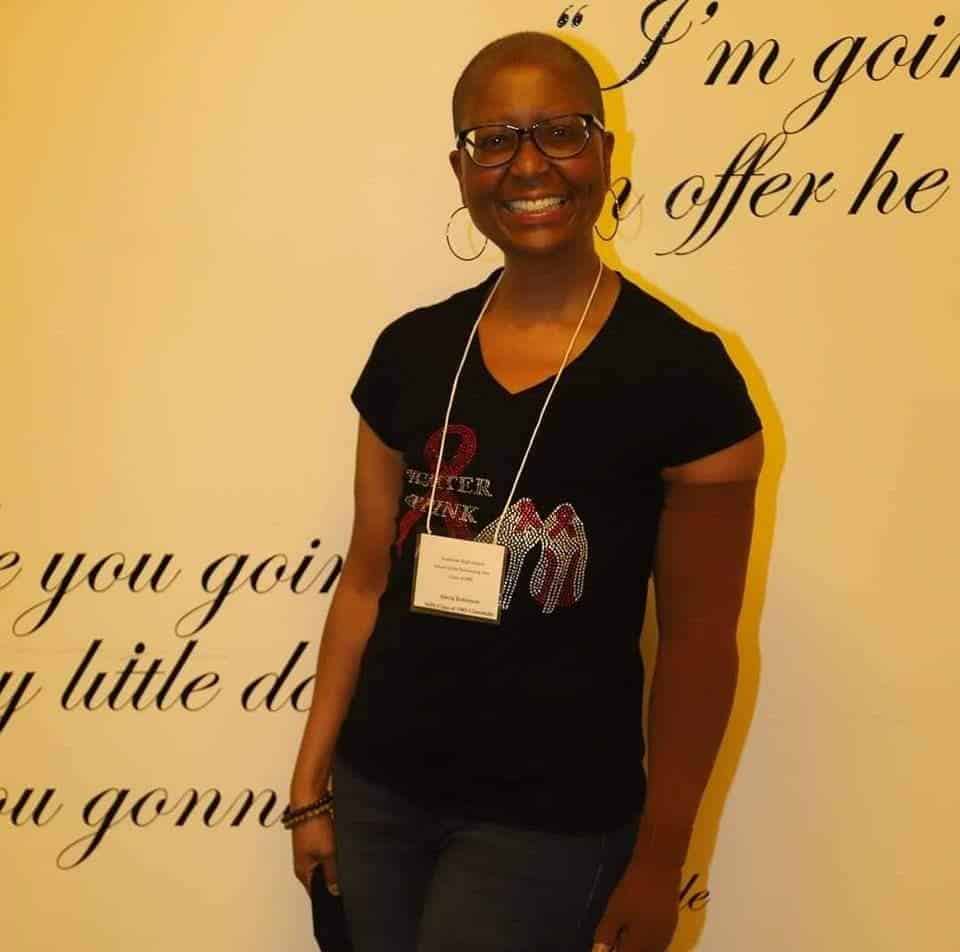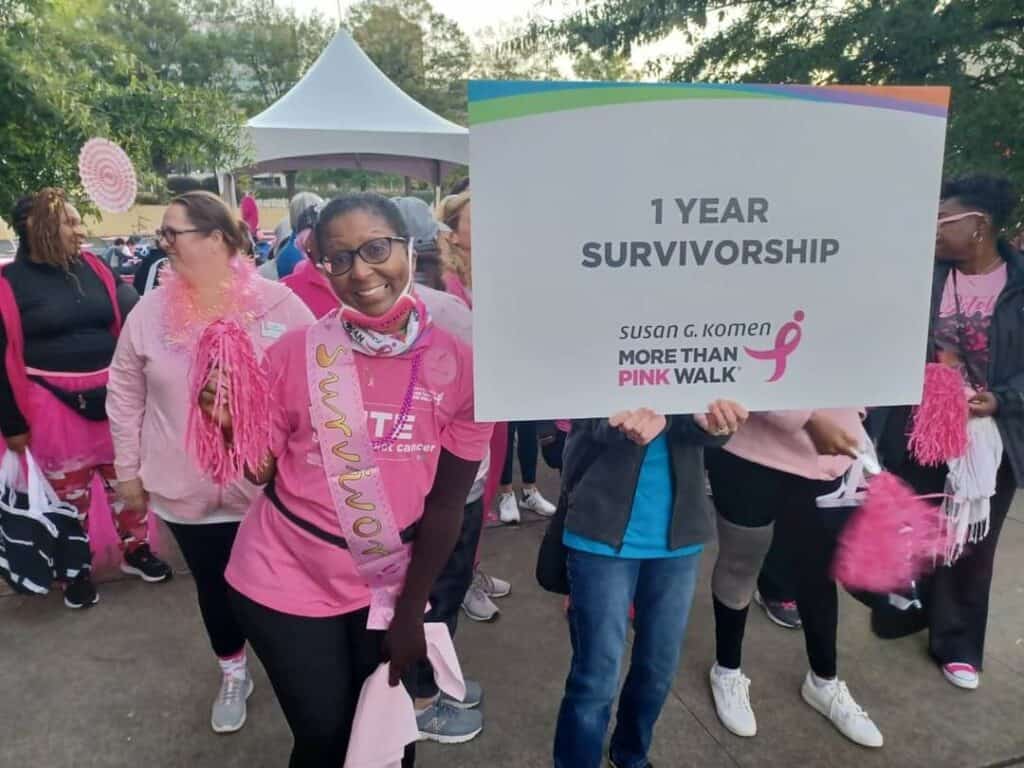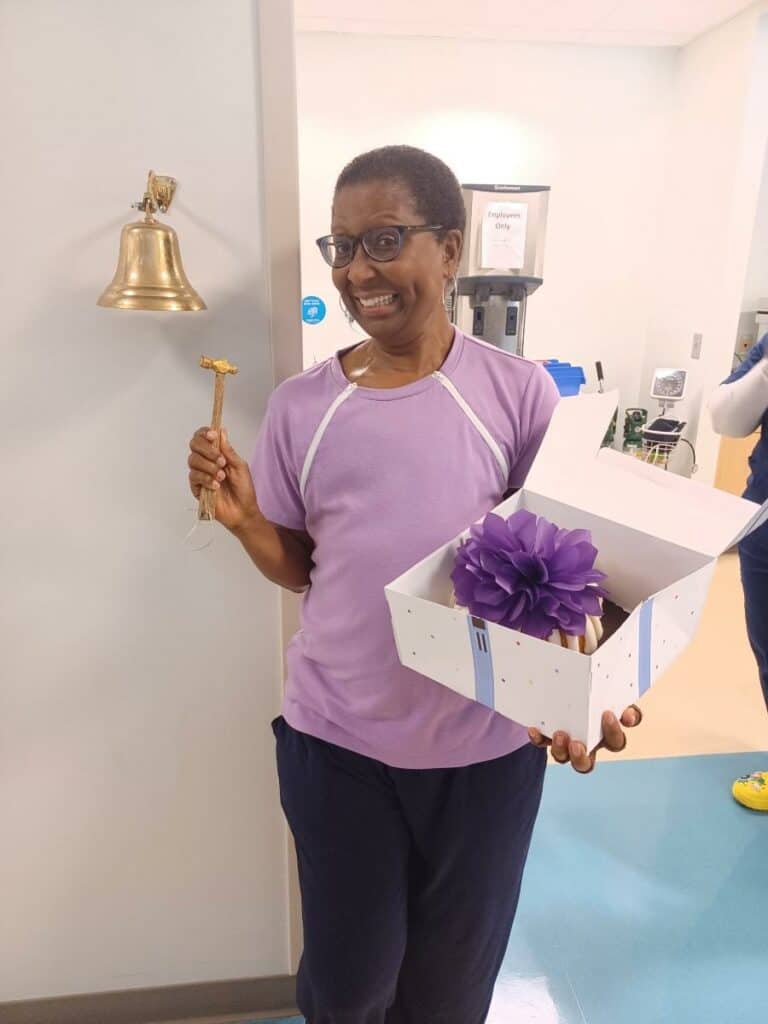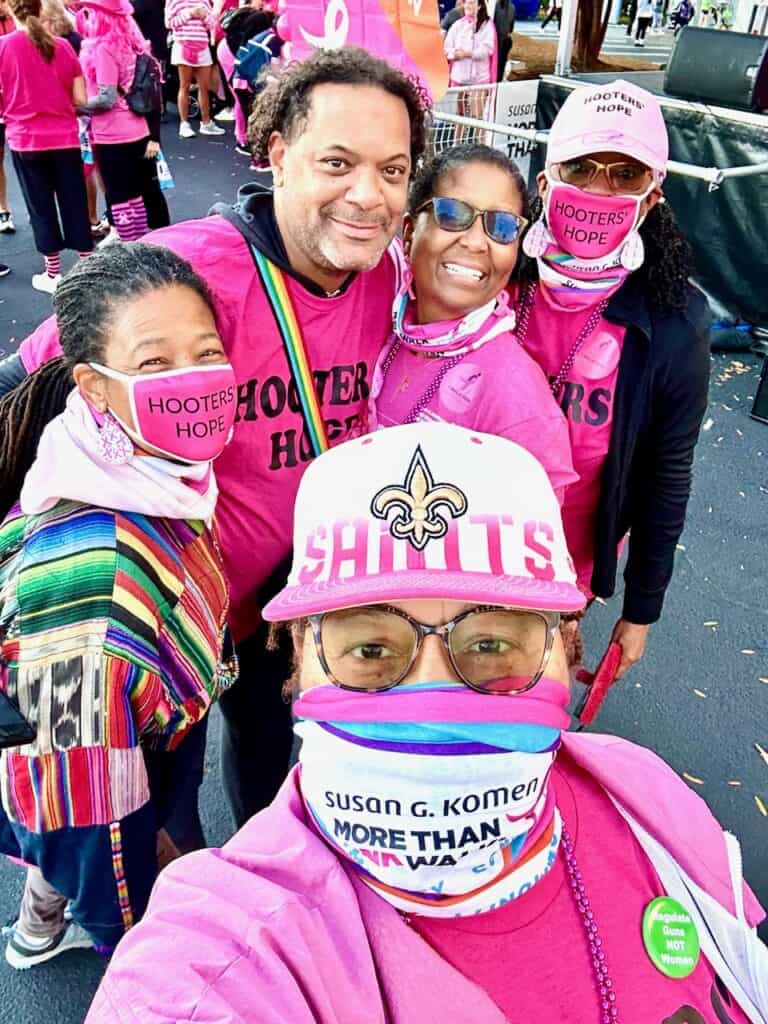
Because of a family history of breast cancer, Alecia Robinson underwent twice yearly breast MRIs. In April 2022, Alecia was diagnosed with stage 1A invasive ductal carcinoma ER, PR+, HER2+. This is her story in her own words.
I felt no particular sense of anxiety when I left my breast MRI appointment in April 2022 because, at that time, those appointments had been part of my regular routine for the past year and a half and, fortunately, each time the results had come back with no concerning changes.
On that day’s checklist, I ticked off my MRI. Then I headed to the mall to buy clothes for an upcoming vacation. I was supposed to leave in five days to visit family in the Virginia/Maryland area.
But less than two hours after my MRI, as I am happily sorting through racks of clothing, my phone rings, and it is the doctor who has my MRI results. “Ms. Robinson, we see something on this MRI that was not there on your last one, and we need you to come in to have an ultrasound,” the doctor said. “If we see the same concerning spot on your ultrasound, we will do a biopsy right then and there. Are you available to come in tomorrow?”
The next day, I have the ultrasound and the doctor sees the same spot. I have a biopsy that same day. Two days later, while at work, I get another call, “Ms. Robinson, unfortunately, it is breast cancer.”
My medical history, my experience walking the breast cancer treatment journey alongside my aunt who had breast cancer, and my work in the area of medical education case simulation meant that I knew many of the questions to ask my doctors. I had some idea of what to expect as I moved forward in treatment and yet my journey through breast cancer almost emotionally broke me…almost.
Within the two weeks after my diagnosis, I had an MRI, an ultrasound, a mammogram and two biopsies. I also met with my breast surgeon. Things were moving fast – major treatment decisions, lifechanging decisions were having to be made and even me, a woman who had ridden all of those bucking bulls in all of those other major health issue rodeos, was struggling to hold on, stay calm and figure out what were the right decisions to make.



According to all of the tests and imaging, I had a small tumor in my left breast and no indication it had spread to my lymph nodes. My surgeon said that I was most likely looking at stage 1 cancer, however, that could not be confirmed until after my surgery and pathology reports were in. Based on the information that we had, I was a good candidate for a lumpectomy. Going the lumpectomy route, I would also need to have chemotherapy and radiation.
My other option was to have a mastectomy followed by chemotherapy, but no radiation. I wanted to make the decision right then as I wanted to get the surgery scheduled as soon as possible. After being given some time, right there in the surgeon’s office to think about it and discuss it with my sister, I made the decision to have a lumpectomy. It was scheduled for a couple of weeks later and would take place about a month after my diagnosis. My sister and I left the surgeon’s office, and in the hours that followed, though the surgery had been scheduled and everything had been set, I still felt unsettled about my decision.
After a conversation with another of my medical specialty doctors and after giving it some more serious thought, I came to the conclusion that for both personal and medical reasons, I really did not want to go through radiation. I determined a mastectomy would be best for me. The only question now was whether I would have only the affected breast removed or would I have both breasts removed. Although none of us can assuredly predict the future, at that moment, all I could hear was my inner voice emphatically saying, “Go ahead. Take both of them because you can’t do this again.” I ultimately decided to have a double mastectomy.
What energy I had after surgery was used just trying to get through each day, each week and each month of chemotherapy. I was too weak to work and as an independent contractor, I did not have the benefit of sick pay from a job. There were still bills that had to be paid and costs for supplements that I took to ease the chemotherapy side effects.
I knew that there were organizations that offered financial assistance to breast cancer patients, including Komen, who I reached out to. What I remember about the exchange I had with the Komen representative who was on the phone with me was her warmth and her eagerness to share how the Komen Financial Assistance Program could possibly help me. Later, I would think about how important that comforting energy was to me as I explained my needs to her. For those patients who might feel hesitant or self-conscious about asking for financial help, her reassuring energy was calming. She told me about the fairly simple process to apply.
I completed the short application, got the necessary documentation from my oncologist and within a few weeks, the Komen financial assistance money was deposited into my checking account. I was struck by how easy Komen made the process to apply for help.
That an organization like Komen can step in and help those who are fighting for their health and their lives is a true gift. Komen lifts some of the burden. With great support from family, friends and Komen, I pushed on through treatment, rang the bell on July 3, 2023, and now, three months shy of two years after diagnosis, here I am gratefully claiming that I am a breast cancer survivor.
Statements and opinions expressed are that of the individual and do not express the views or opinions of Susan G. Komen. This information is being provided for educational purposes only and is not to be construed as medical advice. Persons with breast cancer should consult their healthcare provider with specific questions or concerns about their treatment.



